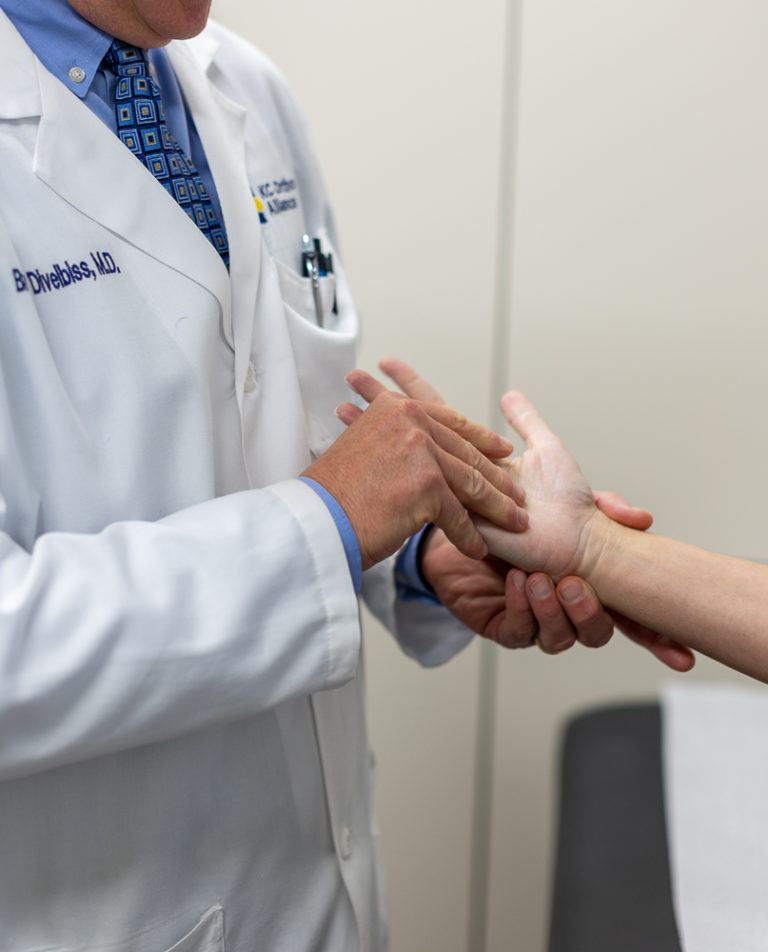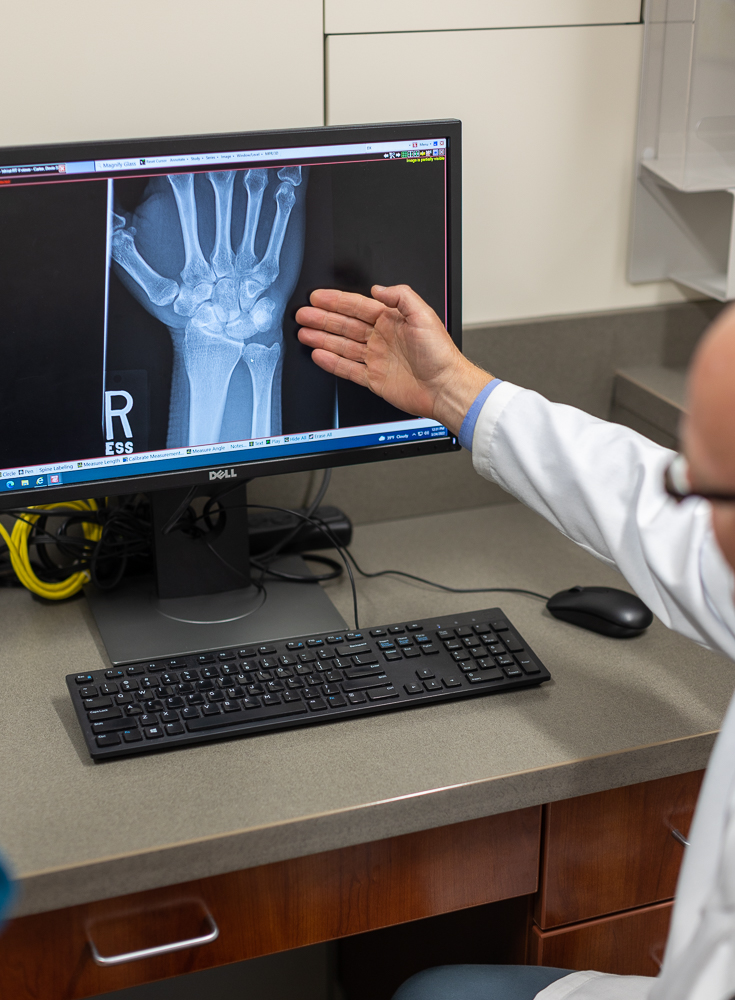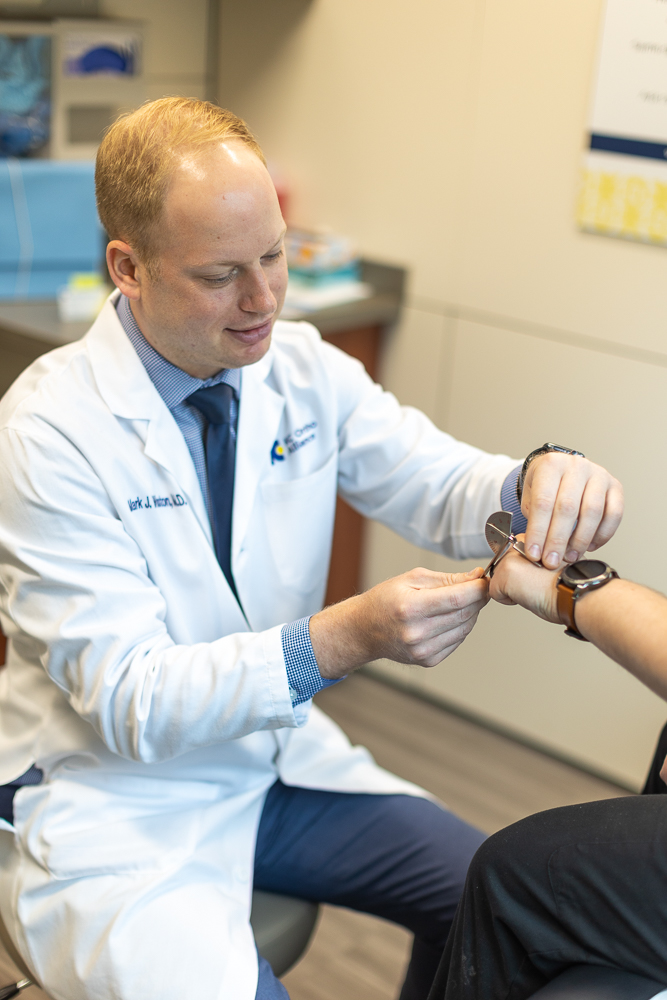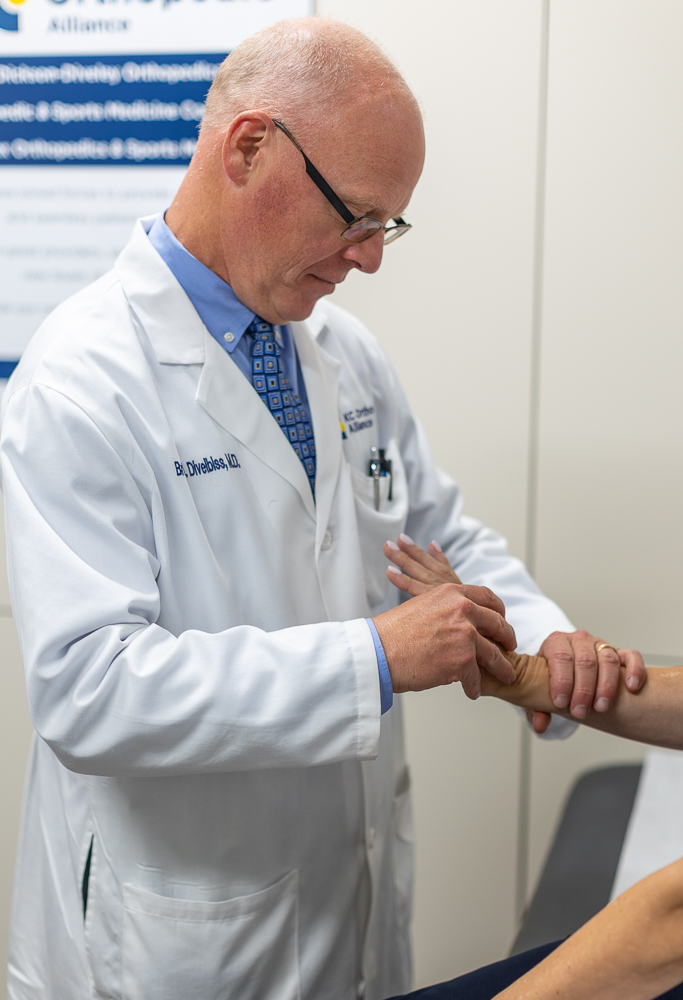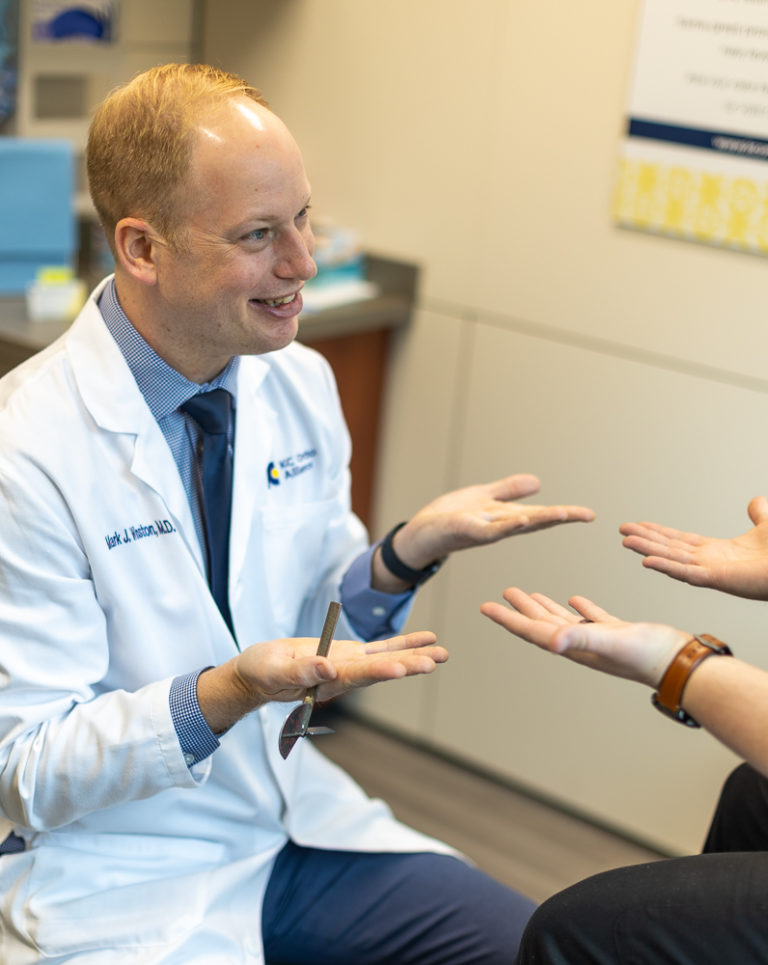Wrist & Hand Fracture Management in Kansas City
Fracture Management
Your Solution to
Hand & Wrist Discomfort.
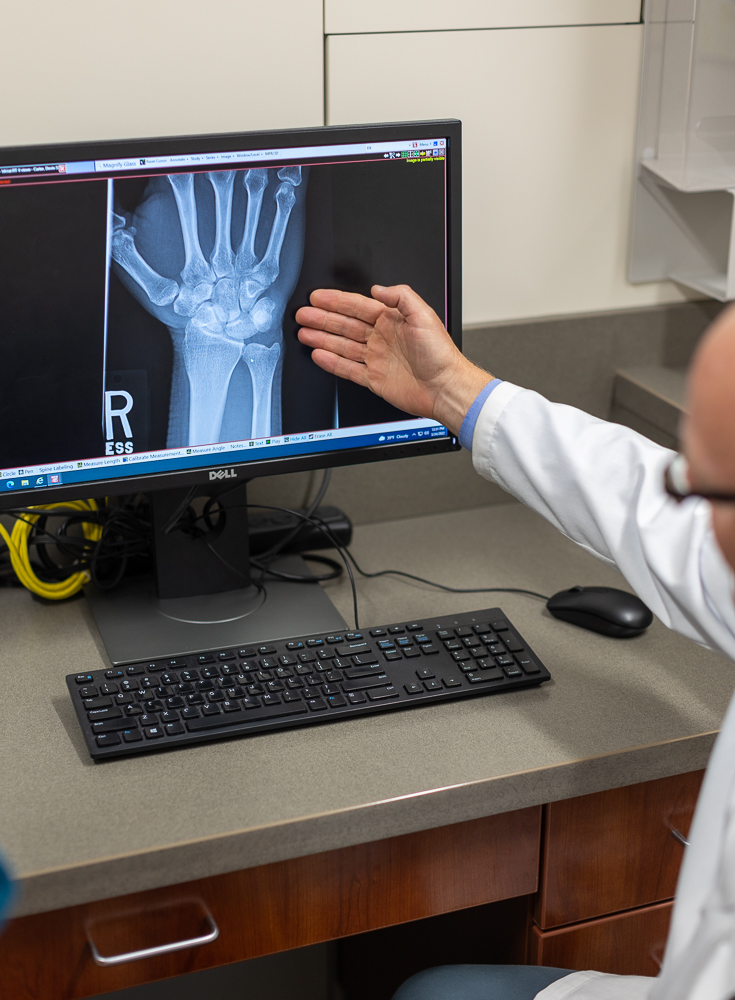
Understanding the Basics Behind Hand & Wrist Pain
What is Fracture Management?
Hand and wrist fractures are relatively common injuries that can happen to anyone at any time. Often, fractures are the result of an acute injury, such as a vehicle accident, an athletic injury, or a fall at home. Fractures related to stress or chronic conditions can occur in the wrist and hand, they’re just much less common than in other weight-bearing parts of the body.
Fracture management aims to treat the fracture through stabilization and pain control. With the help and expertise of an experienced orthopedic specialist, Kansas City Orthopedic Alliance can ensure a proper diagnosis and treatment plan. With over 140 years of combined service, we utilize the best technologies and techniques customized to each patient.
After your initial examination with a KCOA physician, we will recommend the best treatment for your needs. Our practitioners provide the comprehensive care you need so you can return to the activities you enjoy.
Your First Appointment for Hand & Wrist Injuries
Choosing fracture management in Kansas City is a decision that typically involves guidance from your primary care doctor and orthopedic physician. When you choose Kansas City Orthopedic Alliance, one of our highly-trained orthopedic hand and wrist specialists will conduct an initial evaluation to better understand your condition. After a complete review of your results, your provider will discuss whether fracture management is the best treatment option for you.
Symptoms of a hand or wrist fracture include:
- Sudden intense pain
- Malalignment
- Inability to straighten your hand, fingers or wrist
- Swelling
- Bruising
- Tenderness in the affected area
- Pain with movement of the joint
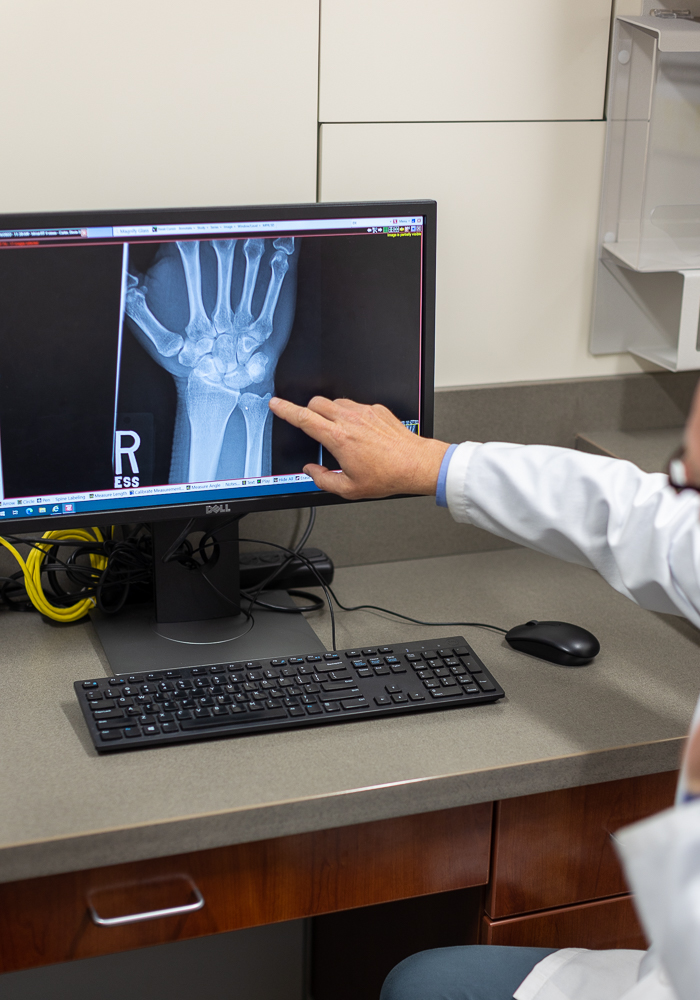
Kansas City Orthopedic Alliance hand & Wrist Assessment
Assessing the Injury
Determining the proper treatment process for hand and wrist injuries starts with an assessment from one of our experienced providers. You can think of hand and wrist pain as a spectrum, with some instances being more severe than others.
The KCOA orthopedic specialists always focus on each patient and their concerns before creating a treatment plan.
Therefore, during your initial appointment, we will often ask questions such as:
- Does your pain currently limit you or your activities?
- Has your pain progressed or worsened recently?
- How did the injury occur?
- Did you notice or hear a popping or cracking sound at the time of your injury?
- Have you noticed any change in your symptoms that has made it more challenging to function?
- What are your lifestyle goals?
- How has pain affected those goals?
From there, we can decide what treatment option will align best with your needs and lifestyle goals.
How it Works
Examination
Once we’ve completed a proper assessment, your provider will often begin with a physical examination to help determine the origin point of your pain. In some cases, advanced testing may be required for a full diagnosis.
X-Ray
Also called radiographs, an X-ray captures a picture of the wrist. Orthopedic physicians may order an X-ray to rule out the possibility of a fracture (broken bone), osteoarthritis, or other bone-related conditions.
Magnetic Resonance Imaging (MRI)
MRI captures images of muscles, bones, ligaments, cartilage, and tendons to help provide information other tests can’t detail. During an MRI, you will lie on a table that slides into a tube-shaped scanner. The machine creates a magnetic field around you, using pulsed radio waves to form the MRI images.
Symptoms
Common Signs and Symptoms of Hand & Wrist Fractures
With so many different parts working together in your hand and wrist, there are many potential causes of hand and wrist pain. And each of those causes has a unique set of symptoms.
Hand and wrist fractures can occur in a number of ways, including direct blows, like a fall or impact from an object, indirect blows, or due to underlying conditions like osteoporosis. If you do have a fracture, you may notice symptoms like sudden pain, swelling, bruising, and more.
Causes
Causes of Hand & Wrist Pain
The body has a number of different joints that all work in unison in order to function normally. However, all of these different working parts means that your hand and wrist can face a variety of potential injuries, such as a fracture. How severe your hand and wrist pain is will vary depending on a few different key factors, including both the location and the source of the problem.
As with many of the other joints in your body, both the hand and wrist are susceptible to acute injuries, like a fracture. It’s rare to see a stress-related fracture in the hand or wrist, as the soft tissue of your hand and wrist, consisting of muscles, tendons, nerves, and ligaments, help to protect these joints and bones.
Whether you’re suffering from an acute or chronic injury, the hand and wrist specialists at Kansas City Orthopedic Alliance are here to assist. We’ll help you find the root cause of your pain and determine whether fracture management is right for you or if you require a different treatment. Common causes of hand and wrist pain include:
Treatment Alternatives
Generally, surgery is not the first choice for treatment at Kansas City Orthopedic Alliance. However, symptoms, malalignments/deformities and function will help guide our treatment recommendations for fracture management. If we can treat your hand/wrist fractures with more conservative treatments, we will do so. We typically exhaust all non-surgical options prior to recommending surgery.
Physical & Occupational Therapy
Seeking out guidance from a trained therapist to help restore function and strength is often a preferred treatment. Therapists are experts in the musculoskeletal system, and their ability to assist with manual techniques or exercise instruction can lead to excellent outcomes.
Immobilization
Immobilization involves the use of casts, splints, or slings to allow the affected area to heal. Using immobilization, we can protect the elbow fracture and allow the site to heal while reducing pain and swelling.
Medications
Your doctor may recommend over-the-counter NSAIDs (Non-steroidal anti-inflammatory drugs, such as Advil) or prescription medications. Especially with NSAIDs, you should always talk to your doctor to ensure they are the right treatment for you.
F.A.Q.
Frequently Asked Questions
Kansas City Orthopedic Alliance is here to help.
Our care is personal. Our team is knowledgeable. And we’re more available than ever.
With access to board-certified specialists across Kansas City, we have the tools to meet almost every musculoskeletal condition.
Our Locations
Overland Park, Kansas
10777 Nall Ave Suite 300 Overland Park, KS 66211Leawood, Kansas
3651 College Blvd. Leawood, KS 66211Kansas City, Missouri
Saint Luke's Medical Plaza #1 4320 Wornall Rd., Ste. 610 Kansas City, MO 64111Belton, Missouri
Belton Regional Campus 17067 S Outer Rd #301 Belton, MO 64012Blue Springs, Missouri
St. Mary’s Medical Center, Main Entrance 203 NW R.D. Mize Road, Suite 200 Blue Springs, MO 64014Shawnee Mission, Kansas
7450 Kessler St ste. 140 Merriam, KS 66204Prairie Star (Lenexa, Kansas)
Prairie Star 23401 Prairie Star PkwyBldg. B, Ste. 220 Lenexa, KS 66227

